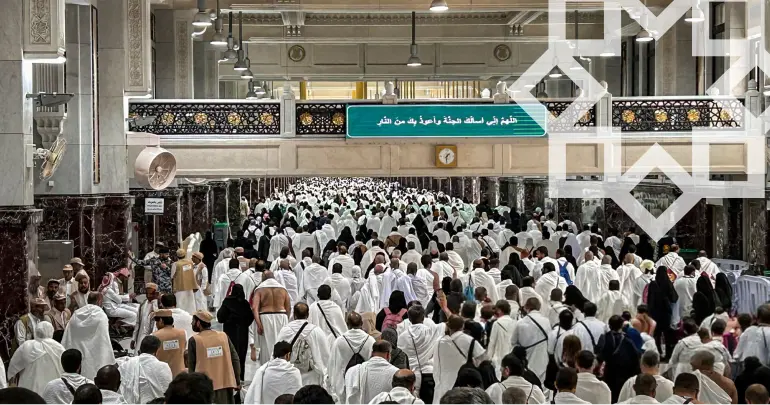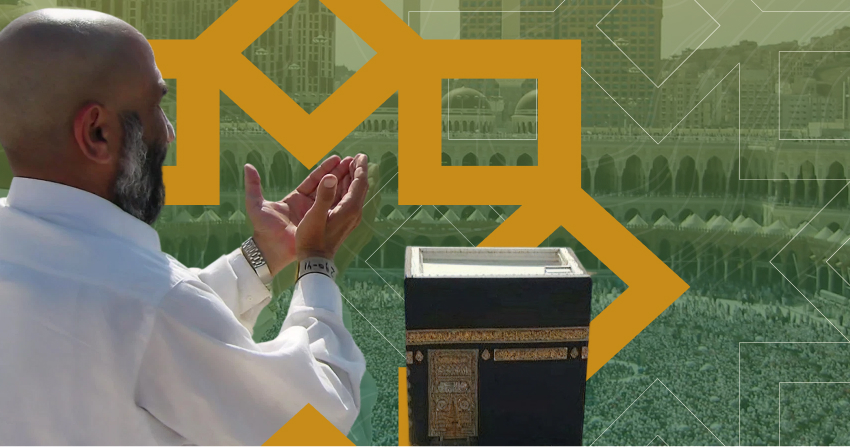Hajj, one of the five pillars of Islam, is a deeply spiritual journey that Muslims undertake once in their lifetime. The pilgrimage takes place in Makkah, Saudi Arabia, where a series of meaningful rituals are performed. These rituals are not just acts of worship; they are powerful lessons in patience, perseverance, and faith. As we reflect on each ritual, we can draw valuable insights that resonate in our everyday lives, especially in how we approach charity and support those in need. Let’s explore the key rituals of Hajj and the profound lessons they offer.
Ihram: The Beginning of the Journey
The pilgrimage begins with entering a state of spiritual purity called Ihram, where men wear simple white garments and women dress modestly. This state represents both a physical and spiritual cleansing that marks the beginning of a journey centred on complete submission to Allah. In this sacred state, pilgrims refrain from certain actions, including fighting, swearing, and even cutting their hair, in order to remain focused on the holiness of the journey.
The act of entering the Ihram teaches us the value of discipline and patience. In our everyday lives, patience is essential when facing temptations or distractions. It also reminds us that giving charity, whether donating for Palestine or paying Zakat, requires purifying our hearts and intentions as well as ensuring that our actions align with our faith.
Tawaf: Circling the Kaaba
One of the most iconic rituals of Hajj is Tawaf, where pilgrims walk around the Kaaba seven times in a counterclockwise direction. This profound act of devotion signifies a believer’s constant remembrance of Allah and submission to His will. It’s a powerful symbol of unity, not only in the act of worship but also in the collective bond of the Muslim ummah, all circling the sacred house of Allah in harmony.
Tawaf also teaches a valuable lesson in perseverance. While it is spiritually fulfilling, the journey around the Kaaba can be physically demanding, especially with the large crowds and the heat. Yet, despite the exhaustion, pilgrims continue with unwavering commitment. This mirrors the importance of persistence in both worship and good deeds. Just as perseverance is essential in acts of devotion, it’s equally vital when giving charity, such as donating food to those in need or supporting water relief efforts. Our dedication, whether in worship or charity, must remain strong.

Sa’i: Running Between Safa and Marwah
After completing the Tawaf, pilgrims perform Sa’i, walking seven times between the hills of Safa and Marwah. This act honours Hajar, the wife of Prophet Ibrahim, who ran between the hills in search of water for her son, Prophet Isma’il. It is a reminder of her trust in Allah’s mercy and the strength she showed in her perseverance.
The Sa’i teaches us the importance of patience and determination. Just as Hajar kept moving forward, despite the hardship, we are reminded that, in life’s challenges, we must trust that Allah will provide. This is also reflected in our charitable actions, whether it is through Zakat or Sadaqah donations, perseverance in giving can have a meaningful and lasting impact, even when the journey seems tough.
Mina: The Day of Sacrifice
During Hajj, pilgrims in Mina take part in the ritual of Qurbani, the sacrifice of an animal such as a sheep, goat or cow. This honours the story of Prophet Ibrahim (AS), who was ready to sacrifice his son Isma’il (AS) out of obedience to Allah. In His mercy, Allah replaced Isma’il with a ram to be sacrificed instead.
Qurbani is more than a ritual. It is a powerful lesson in devotion and selflessness. Just as Prophet Ibrahim (AS) was willing to give up what he loved most, we too are encouraged to give from what we have for the sake of Allah. Here in the UK, this spirit of giving can be reflected in donating your Zakat or supporting local and global charitable causes. When we share our wealth with those in need, we keep the essence of sacrifice alive in our own lives.
Let the spirit of sacrifice guide you. Your donation can bring hope to those struggling.
Donate your zakat
Fulfil your obligation today – give Zakat and be a source of hope for those in need!
Standing at Arafat (Wuquf)
One of the most powerful moments of Hajj is standing at Arafat. Pilgrims spend the afternoon on the plains of Arafat, praying, reflecting, and asking Allah for forgiveness. It is a day filled with hope, a time when hearts are open and Allah’s mercy is poured upon those who truly repent.
But it is also a day that tests your patience. The heat, the hours, and the emotional weight of the moment can be tough. Still, there’s something deeply spiritual about it. Standing there reminds us that just as we wait for Allah’s mercy on this day, we should carry that same patience into our everyday lives.
The Ritual of Stoning the Jamarat
During the final days of Hajj, pilgrims take part in the ritual of Jamarat, the symbolic stoning of three pillars in Mina. This powerful act represents the rejection of Satan and honours the moment when Prophet Ibrahim (AS), alongside his son Isma’il (AS), resisted the devil’s temptations in obedience to Allah.
This ritual is more than just a tradition. It reminds us to stay strong when faced with life’s challenges. Just as Prophet Ibrahim (AS) stood firm, we are encouraged to show patience, perseverance and unwavering faith.
Whether it is resisting everyday distractions or staying committed to doing good, such as giving to charity, feeding the hungry or supporting clean water projects, this act calls on us to remain focused, generous and spiritually grounded.
Bringing hope through small acts of kindness—a meal, a helping hand, or a gift can light up a child’s day.
Shaving the Head or Trimming Hair
After completing the major rites of Hajj, male pilgrims shave their heads while female pilgrims trim a small portion of their hair. This meaningful act reflects humility and marks a fresh chapter, letting go of the past and embracing spiritual growth.
Just as this act signifies personal transformation, giving to charity is also a way of offering a part of ourselves. True giving comes from the heart. It not only cleanses our wealth but also refines our intentions. Much like Hajj renews the soul, selfless giving allows our compassion and good deeds to flourish.
Unity Among Muslim Communities
One of the most beautiful aspects of Hajj is the deep sense of unity it creates among Muslims. Pilgrims from all corners of the world, from different races, nationalities, and social statuses, come together in Makkah for one shared purpose: to worship Allah.
As pilgrims wear the simple white garments of Ihram, the differences that often divide us, like wealth, race or nationality, fade away. In that moment, everyone stands before Allah as equals, a powerful reminder that superiority lies only in faith and good deeds. The sight of millions of people praying together, bowing in unity, serves as a powerful reflection of the strength of the Muslim ummah (community).
This unity goes beyond just a symbolic act. It carries deep lessons for all. Hajj teaches us that despite our differences, we belong to one global community of believers. The shared rituals and experiences strengthen our bonds and highlight the importance of solidarity, mutual support and love for one another.
Beyond the physical journey to Makkah, this unity extends to the daily lives of Muslims worldwide. It encourages us to work together for the common good, support one another in times of need, and build a stronger, more compassionate community.
Take the first step today. Your act of charity can bring hope and change to someone in need.
How Hajj Inspires Us to Give
The rituals of Hajj, from entering the state of Ihram to the stoning of the pillars, remind us of the importance of patience, perseverance and sacrifice. These values are not only central to Hajj but also guide us in our daily lives, especially when it comes to giving to others.
Just as pilgrims face physical and emotional challenges during their journey, we are encouraged to remain steadfast in our support for those who are struggling. Whether it is through your Zakat, a donation to a Palestine appeal or contributing to a clean water project, the spirit of Hajj inspires us to keep giving with sincerity and strength.
By embracing the lessons of Hajj, we strengthen our connection to Allah and become a source of hope for others. So, let’s continue to give charity with patience and perseverance, knowing that every act of kindness brings us closer to Allah’s mercy.
The spirit of Hajj lives in each of us. Contribute now to help those who need it most.
